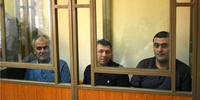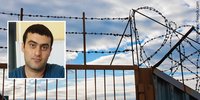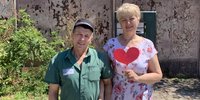The Case of Avanesovs and Others in Rostov-on-Don
Filter
- #
Employees of the Investigative Committee of Russia conduct searches in at least 15 houses of Rostovites who are suspected of professing the religion of Jehovah's Witnesses. In some cases, riot policemen use force when breaking into apartments. Vilen and Arsen Avanesov, as well as Aleksandr Parkov, were detained. A criminal case was opened against them for their faith under Article 282.2 (1) of the Criminal Code of the Russian Federation.
- #
- #
According to the decision of Victoria Mamelko, judge of the Leninsky District Court of Rostov-on-Don, all three believers were sent to SIZO-1 in the Rostov Region for 2 months.
- #
The court extends the detention of Arsen and Vilen Avanesov, as well as Aleksandr Parkov.
- #
The court extends the detention of Arsen and Vilen Avanesov, as well as Aleksandr Parkov.
- #
The court extends the detention of Arsen and Vilen Avanesov, as well as Aleksandr Parkov in custody until 20.12.2019
- #
The Rostov investigator of the Investigative Committee of Russia, Major Kalnitsky, opens another criminal case against 36-year-old Arsen Avanesov. The believer is accused of receiving donations to rent premises for meetings of fellow believers, which the investigator equates with financing extremist activities (part 1 of article 282.3). About two months ago, the same investigator opened a similar case against another Rostov resident, Semyon Baibak.
- #
The Leninsky District Court of Rostov-on-Don extends the period of detention of Vilen and Arsen Avanesov, as well as Alexander Parkov, for another month, until May 19, 2020. The total period of detention by this time will be 334 days.
In view of the "special complexity of the criminal case," Judge Snezhana Fedorova finds no reason to change the measure of restraint for the believer. The court does not take into account the special circumstances of prisoners in connection with the coronavirus pandemic (Aleksandr has been diagnosed with an immune disease, and Vilen is at increased risk due to his age).
The believers intend to appeal the court's decision.
- #
The accused begin to familiarize themselves with the materials of the criminal case.
- #
The Rostov Regional Court upholds the decision of the Leninsky District Court.
- #
The Rostov Regional Court, chaired by Judge Yuriy Rusenko, extends Arsen Avanesov's detention for another 2 months and 29 days, until August 19, 2020. By this day, the believer will spend 455 days behind bars.
The court justifies its decision by the fact that the accused does not have time to familiarize himself with the materials of the criminal case (more than 20 volumes) within the prescribed period. According to Judge Rusenko, it is impossible for a believer to do this at large, since he "can hide from the investigation and the court" and "influence witnesses."
The court does not take into account that Arsen, while remaining behind bars, cannot support his elderly mother. The investigating authorities have not allowed her to see either her husband or her son for a year now.
- #
The judges make a similar decision in relation to Vilen Avanesov and Aleksandr Parkov, without taking into account the state of health of Aleksandr, who has an immune disease, as well as Vilen's elderly age. The believers will remain in custody until August 19, 2020.
- #
The Court of Appeal does not take into account the complaints of Alexander Parkov and upholds the decision of the Rostov Regional Court regarding the extension of his preventive measure in the form of detention until August 19, 2020.
- #
The Leninsky District Court is holding hearings on the merits behind closed doors. Prosecution witnesses are being questioned. Andrey and Ekaterina Okhrimchuk claim that the investigator distorted their testimony. Investigator Antipov is trying to prove that the Okhrimchuk spouses are active members of the LRO and that this is allegedly confirmed by their words during the investigation. Ekaterina claims that during the investigative interrogation, operative Chaikin attributed to her a whole paragraph of hearsay from other testimonies.
The specialist is a religious scholar from the Southern Federal University. According to him, the essence of religion is impossible without believers gathering together and performing their rites. The specialist notes that it is impossible to determine from the video recordings that they are an ordinary worship service or a meeting of the LRO.
- #
The hearing on the case continues in the Leninsky District Court. Due to the epidemiological situation, listeners are not allowed to attend the court hearing.
The prosecutor examines the prosecution witness. He asks her general questions about the defendants' religion and their worship meetings. The woman positively characterizes the religion of Jehovah's Witnesses, referring to the believers themselves as "good people." He explains that "they do not drink alcohol before services, as this is a sacred service."
From the words of the witness, it becomes clear that water baptism does not mean membership in a local religious organization - a legal entity.
At the request of the defense, the charter of the local religious organization shall be read out. When asked about the LRO, the woman replies that "she knows nothing about membership in the LRO, and she saw its charter for the first time here, in court." She explains that the defendants simply "profess the religion of Jehovah's Witnesses."
The interrogation lasts 2.5 hours.
- #
The prosecution's witness, the administrator of the dance school, does not appear in court.
The hearing will continue on January 28, 2020.
- #
In the Leninsky District Court of Rostov-on-Don, by order of the chairman, from January 20, 2021, visits to listeners have been opened, but with a distance of 1.5 meters. However, after 2 hours of waiting, the judge does not allow anyone who came to the hearing.
Prosecution witnesses are being questioned. One of them, a dance teacher who rented out the dance halls, cannot identify Arsen Avanesov among the three defendants.
- #
4 people are allowed into the meeting room.
The prosecution shall submit the written statements of witnesses.
- #
Witness Ruslan Alyev tells what a local organization is as a legal entity and who the elders are. They are not congregation leaders or organizers, they are ordinary believers who meet the requirements recorded in the Bible. According to him, there is no need to specifically convene anyone for worship, nothing illegal is happening either in forms or in actions.
Another witness, Lyudmila Ponomarenko, states that she will use Article 51 of the Constitution of the Russian Federation and will not answer questions from the prosecutor, because she realizes that she, an elderly person, is being tried, like the Avanesovs and Parkov, solely for her faith in God, although both the Russian Constitution and the Supreme Court reserve her the right to practice any religion.
At the next court session, it is planned to interrogate witnesses who did not appear.
- #
Vilen and Arsen Avanesov, as well as Aleksandr Parkov, are transferred to pre-trial detention center No. 5 at 4 Tunnelnaya Street in Rostov-on-Don. The believers have been imprisoned for 1 year and 10 months.
- #
The court interrogates the operative, a former employee of the Center "E" A. Chaikin. Chaikin finds it difficult to answer most of the defensively's questions about the continuation of the activities of the banned organization, about the receipt and use of literature included in the Federal List of Extremist Materials.
The lawyer asks the witness questions, trying to find out what he meant, for example, by "continuing the activities of a banned organization." Chaikin says it's just a guess.
- #
The court is questioning two more witnesses. They have long been familiar with the defendants, who are characterized as "peaceful, good, law-abiding people." Witnesses also explain the difference between meetings of a legal entity and worship services.
- #
The court interrogates a secret witness - a man who, on the instructions of FSB officers, conducted conversations with believers, trying to provoke them to criticize other creeds and the state. The provocateur was often the initiator of the meetings himself, but in court he claims that the meetings took place against his will. He hardly remembers his earlier testimony and says that he has a very negative attitude towards Jehovah's Witnesses. At the same time, he admits that he has not heard any extremist appeals from them.
- #
Judge Vladimir Khudaverdyan granted the petition to examine all the video recordings of the services, noting in advance that there is no enmity or hatred at the meetings of believers.
- #
The defendants testify. Arsen Avanesov explains that meetings of fellow believers are not extremist activities, but a peaceful confession of faith. In their dealings with authorities and people, Jehovah's Witnesses try to be correct, restrained, not to respond to rudeness, and to follow the example of the first Christians and Jesus Christ.
When asked by the judge why Jehovah's Witnesses often use Article 51 of the Constitution of the Russian Federation, Arsen Avanesov replies that the state itself guarantees a person the right not to testify against himself. And even if investigators and judges remind us of this constitutional right, Jehovah's Witnesses consider it really important.
- #
During the pleadings in Rostov-on-Don, the prosecutor requests 7.5 years of imprisonment for Arsen Avanesov and 7 years of imprisonment in a general regime colony for Vilen Avanesov and Aleksandr Parkov.
On the same day, believers deliver the last word. The verdict is scheduled for July 29.
The last word of the defendant Alexander Parkov in Rostov-on-Don The last word of the defendant Arsen Avanesov in Rostov-on-Don Vilen Avanesov's last word in Rostov-on-Don - #
Judge of the Leninsky District Court of the city of Rostov-on-Don, Vladimir Khudaverdyan, finds Jehovah's Witnesses Alexander Parkov, Vilen and Arsen Avanesov guilty. He sentences believers to imprisonment in a penal colony: Aleksandr Parkov and Arsen Avanesov to 6.5 years, and Vilen Avanesov to 6 years. Considering that they have already spent more than 2 years in a pre-trial detention center, in fact, they still have about half of their term left to serve in the colony - unless the court of appeal overturns the sentence.
- #
It becomes known that Arsen and Vilen Avanesov were transferred from the Rostov SIZO-5 to SIZO-3 at the address: Novocherkassk, Ukrainskaya str., 1.
- #
Oleksandr Parkov was also transferred from Rostov SIZO-5 to SIZO-3 at the address: Novocherkassk, Ukrainskaya str., 1.
- #
The hearing of the appellate instance is postponed to November 22.
- #
The appeal hearing scheduled for today is postponed to December 6, 2021.
- #
A panel of judges of the Rostov Regional Court, chaired by Gennady Peschanov approves the terms of imprisonment in the colony for believers: Parkov and Arsen Avanesov - 6.5 years each, Vilen Avanesov - 6.
- #
It becomes known that Aleksandr Parkov was taken to Correctional Colony No. 10 in Rostov-on-Don to serve his sentence. In the same colony, another believer, Aleksandr Ivshin, is serving a prison sentence for believing in Jehovah God.
- #
It becomes known that Vilen and Arsen Avanesov are transferred to a correctional colony in the city of Ulyanovsk. The exact address of their future whereabouts is still unknown.
- #
It becomes known that Vilen and Arsen Avanesov arrived at Correctional Colony No. 3 in the city of Dimitrovgrad (Ulyanovsk Region), where they will serve their sentences for believing in Jehovah God.
- #
The lawyer visits Vilen and Arsen Avanesov in the penal colony in Dimitrovgrad. They say that there are 40 people in their squad, the conditions of detention are normal.
The emotional state of believers is good, there are no health problems. Cellmates and the administration of the colony treat them with respect. Some of the prisoners ask Vilen to pray for them, as they say it helps them.
Arsen works as a cutter in a sewing workshop 5 days a week. For his conscientious attitude to work and active participation in sports events, he received awards from the administration. Vilen does not work as he is retired.
Both believers are glad to have the opportunity to read the Bible, which they received in the colony's library.
Arsen says that for some time they did not receive letters, but since the beginning of April they have received 50 pieces a week for each. Vilen is sent beautiful postcards, which he lays out on the windowsill. The colony staff and cellmates are looking at them with interest.
Arsen and Vilen say that due to the limit - no more than 20 kg in 2 months - some parcels were disposed of. The Avanesovs note that they do not need anything: friends and relatives pass on everything they need.
- #
The lawyer visits Aleksandr Parkov in the Correctional Colony No. 10 in the Rostov Region. Three other Jehovah's Witnesses are being held in the same institution: Artem Gerasimov, Igor Schmidt , and Sergey Filatov.
Parkov's emotional and physical condition is good. In order to spend as little time as possible in the barracks, where it is often smoked, the believer works 6 days a week in the industrial zone. Sergey Filatov also works there. The prisoners of the colony and the administration treat Parkov and other believers with respect. One of the cellmates said: "I can't understand what exactly you are being persecuted for. You are ideal citizens of the state - do not steal, do not cheat.
Alexander has his own copy of the Bible. He receives so many letters that, according to him, he has already lost count. The believer misses his family, but, to his joy, a three-day meeting with his wife took place in March.
- #
The Fourth Court of Cassation of General Jurisdiction in Krasnodar upholds the verdict against Vilen Avanesov and Aleksandr Parkov.
A representative of the Prosecutor General's Office of the Russian Federation speaks before the court. He argues that Arsen Avanesov collected funds to finance an extremist organization (Part 1 of Article 282.3 of the Criminal Code of the Russian Federation) - this is how the prosecution interprets the payment of rent for a place of worship. Earlier, the court excluded this article from the charges.
The court satisfies the prosecutor's request and returns the case to the appeal stage. Arsen Avanesov, who was sentenced to 6.5 years in prison, may have his sentence toughened.
- #
The Rostov Regional Court in a second appeal toughens the sentence to Arsen Avanesov - 7 years in a general regime colony instead of 6 and a half.
- #
A lawyer visits Vilen Avanesov in a penal colony in Dimitrovgrad (Ulyanovsk region). Since August, Vilen has been under light conditions of detention.
The barracks where he works are clean, there is hot water and showers. The believer does not complain about the state of health. In July, he had a 3-day long visit with his wife.
His cellmates and the administration of the colony treat Avanesov with respect. One of the employees notes the positive qualities of Jehovah's Witnesses, that they, not knowing each other personally, write letters of support to fellow believers. She is surprised that even children send cards saying, "We love you." Vilen is looking forward to more letters. He is also glad that he has the opportunity to read the Bible.
- #
The lawyer visits Arsen Avanesov in the Ulyanovsk pre-trial detention center.
According to the believer, he was kept in a barracks all winter, where the heating did not work. He was later transferred to a clean, warm barracks with hot showers.
Currently, Arsen is being held in a cell, where there are 10 other people besides him. His cellmates and administration treat him normally.
Arsen's emotional and physical condition is good. In his spare time, he reads the Bible and also borrows fiction from the library. During his stay in the pre-trial detention center, he received one letter so far, from France.
- #
It becomes known that Arsen Avanesov is in pre-trial detention center No. 1 in the Ulyanovsk region. He can write letters.
- #
It becomes known that Arsen Avanesov is again in correctional colony No. 3 in Dimitrovgrad (Ulyanovsk region).
- #
Aleksandr Parkov participates in the court hearing via videoconference to consider the petition for replacement of imprisonment with correctional labor, since he has already served more than 1/3 of the term.
The colony provides a positive characterization of the believer, but indicates that the replacement is inappropriate. The court refuses to satisfy the request.
- #
Alexander underwent dental treatment. The administration treats the believer well and allows long visits.
- #
Arsen and Vilen Avanesov work in the sewing industry from 8:00 to 20:00 with short breaks during the day. They endure the harsh conditions of their stay in the colony. Arsen needs a medical examination.
Vilen and Arsen have normal relations with their cellmates and the administration, as Konstantin Bazhenov , who served his sentence here for his faith, had a good reputation as one of Jehovah's Witnesses. The Avanesovs have several rewards. The believers are in the same colony with fellow believers from Gukovo, who were convicted in a similar criminal case.
- #
Arsen Avanesov lives in a barracks with 90 beds, where 65 prisoners are kept. He can move around relatively freely and is allowed to make phone calls.
Vilen Avanesov does not lose his sense of humor. His prison term expires in two months. The administration of the colony filed a lawsuit with the court for the appointment of administrative supervision to Vilen, but the court rejected this claim.
- #
Alexander Parkov works in a forge, receives incentives from the administration. The believer has about 7 months of punishment left to serve.
In the colony, Parkov receives the necessary medical care. He regularly receives parcels and letters.
- #
- #
- #
Arsen keeps his spirits up and positive. He receives letters from friends and relatives, and they give him five a month. A believer can read a Bible borrowed from the library.
The conditions of detention are satisfactory, Arsen's relations with the administration of the colony and other prisoners are conflict-free.
- #







